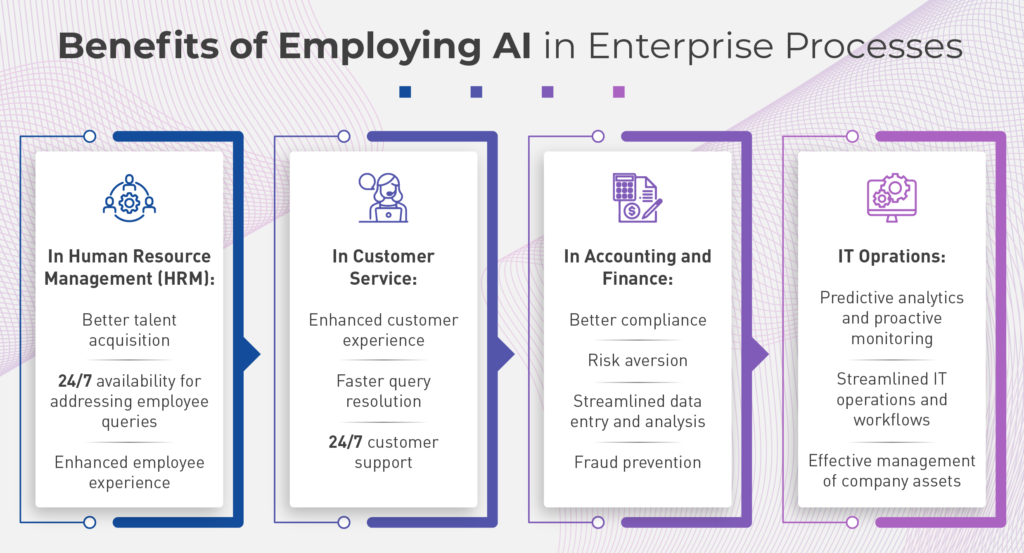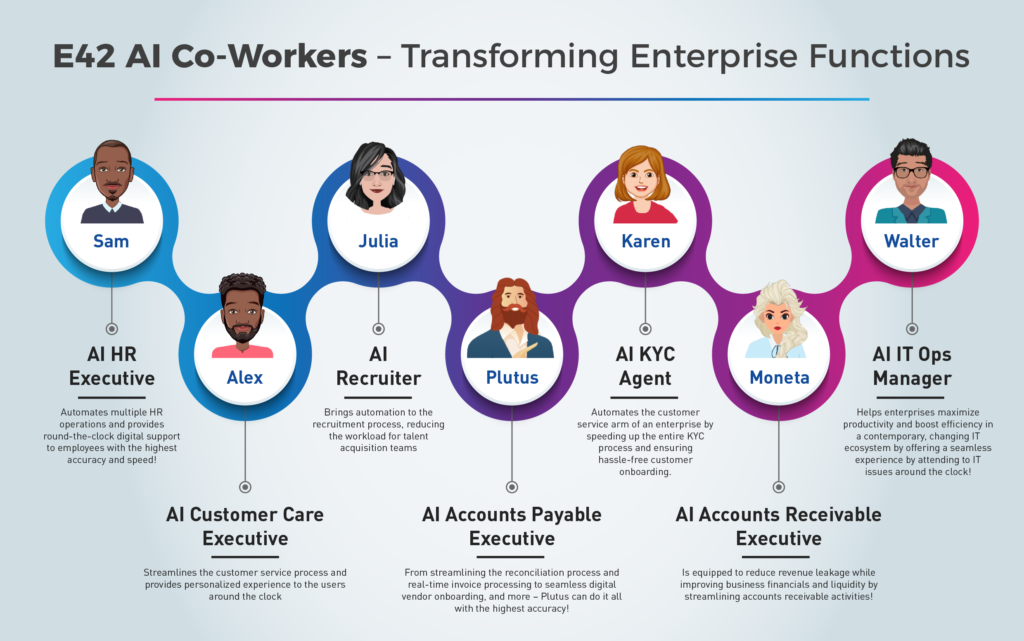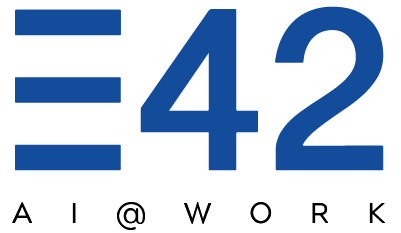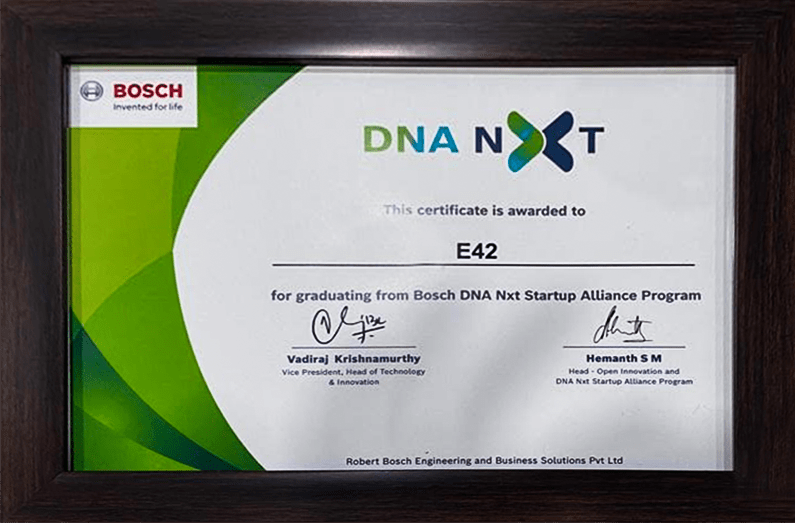Automation is a key driver of innovation and efficiency in today’s business environment. Technologies like AI (Artificial Intelligence), ML (Machine Learning), and NLP (Natural Language Processing) enable enterprises to automate various tasks and processes that are low-skilled, high-volume, or repetitive. These tasks and processes are often beyond the capacity or interest of human workers, making automation technologies indispensable. As a result, many enterprises are adopting RPA (Robotic Process Automation) solutions, such as chatbots, to automate tasks and processes at a macro level. By doing so, they can improve their productivity, accuracy, and stability, while reducing their costs and workload.
However, RPA solutions have their limitations and challenges.
They are often rule-based, rigid, and simplistic, unable to handle complex, dynamic, and contextual situations. Enterprises need a more holistic and intelligent approach to automation that can cater to their evolving and diverse needs. Cognitive Process Automation (CPA) is the solution that can provide such an approach. CPA solutions use AI to automate tasks and processes at a micro level, using natural language, voice, or graphical interfaces. They can also learn from data, feedback, and experience, and adapt to changing scenarios and preferences.
Here is a quick overview of what this article covers:
- What is an AI co-worker?
- Why the Need for AI co-workers?
- Navigating Challenges Across Enterprise Domains:
- Benefits of AI co-worker in Enterprise Process
- AI Co-Workers transforming business processes Across Diverse Verticals
- How E42 AI Co-Workers are Helping Enterprises Function Better
- Conclusion
What is an AI Co-Worker?
An AI co-worker is the epitome of a digital assistant, a multifunctional cognitive agent utilizing artificial intelligence to proficiently execute an extensive array of tasks and processes. Functioning as a technological counterpart, the AI co-worker seamlessly engages with users and various systems through natural language, voice, or graphical interfaces. Beyond mere interaction, its capabilities extend to the analysis of real-time data, providing nuanced insights and recommendations, and autonomously making decisions with minimal human intervention. The intrinsic value of an AI co-worker lies in its capacity to elevate enterprise capabilities, enhance efficiency, and optimize outcomes, thereby affording human workers the latitude to concentrate on more intricate and creative responsibilities.

Why the Need for AI Co-Workers?
Enterprises today grapple with an avalanche of challenges, from the exponential growth in data complexity to heightened customer expectations and the relentless pace of competition. The need for transformative solutions has never been more pressing. Here’s why AI co-workers are becoming indispensable:
- Data Deluge: The sheer volume and complexity of data overwhelms human capacity, necessitating intelligent systems that can swiftly process and analyze information
- Elevated Customer Expectations: As customer demands escalate, enterprises are compelled to deliver not just efficiently but also with a personal touch—AI co-workers step in as invaluable aids, offering personalized and proactive support
- Intense Competition and Innovation: In a landscape where standing still is not an option, enterprises can leverage AI co-workers to continuously enhance performance, agility, and exploration of new opportunities.
- Evolution of the Workforce: The nature of work is changing rapidly, posing challenges in talent management, collaboration, and communication—AI co-workers contribute to navigating this evolving landscape.
Navigating Challenges Across Enterprise Domains:
Within the intricate tapestry of enterprise processes, formidable challenges arise as steadfast adversaries, probing the resilience of diverse domains. From the nuanced orchestration of Human Resource Management to the frontline skirmishes of Customer Support, the meticulous terrain of Accounting and Finance, and the ever-evolving panorama of IT Operations—each sector confronts distinctive hurdles.
Challenges in Accounting and Finance
In the realm of traditional accounting and finance, reliance on established rules and standards is both a strength and a limitation. The evolving business landscape poses challenges that conventional methods may struggle to navigate. Automation emerges as the beacon of innovation, empowering finance professionals to surmount complexities. From managing stringent regulations to ensuring data accuracy, maintaining seamless cash flow, and adapting to financial trends, the challenges are multifaceted.
Challenges in Human Resource Management (HRM)
Human Resource Management (HRM) stands as the linchpin between an organization and its workforce. Yet, in the absence of advanced technologies like enterprise process automation solutions, HRM encounters a spectrum of challenges. From attendance management intricacies to fostering meaningful engagement and grappling with payroll intricacies, the list is extensive. Moreover, the burden of repetitive and mundane operational tasks burdens employees, diminishing their experience and fostering low retention rates.
Challenges in Customer Support
As industries undergo digital transformation, enterprises face a monumental challenge in meeting customer expectations while staying competitive. The limited bandwidth of the human workforce amplifies the struggles in customer service departments. The absence of automation hinders the swift addressing of customer queries, potentially tarnishing the customer experience and jeopardizing retention.
Challenges in IT Operations
The core objective of IT Operations is a delicate balance—providing timely support to end-users while managing the intricacies of complex IT systems. The rapid pace of technological advancement introduces a layer of complexity that can be overwhelming. Conflicting priorities, ranging from ensuring high availability to maintaining security and reducing costs, compound the challenge. Limited resources, including manpower and budget constraints, further intensify the struggle.
Benefits of AI Co-Worker in Enterprise Process
AI co-workers can help enterprises overcome the challenges and improve the outcomes of their processes by providing the following benefits:

- Automation: Various tasks and processes that are tedious, routine, or rule-based, such as data entry, document processing, invoice generation, and report creation, can be automated.
- Augmentation: AI co-workers can augment the capabilities and performance of human workers by providing them with relevant information, insights, and recommendations, such as customer profiles, market trends, product features, and best practices.
- Collaboration: They can collaborate with human workers, customers, and other AI co-workers by communicating, coordinating, and negotiating with them through natural language, voice, or graphical interfaces.
- Adaptation: AI co-workers can adapt to the changing situations and preferences of the enterprise and its stakeholders by learning from data, feedback, and experience and by updating their knowledge, skills, and behavior accordingly.
AI Co-Workers transforming business processes Across Diverse Verticals
Features of AI Co-Workers for Accounting and Finance
- Data Entry: Utilizing advanced technologies like natural language processing and intelligent character recognition, the system efficiently extracts and analyzes pertinent information from financial documents such as invoices, receipts, and bank statements. Following this, it validates and categorizes the information before seamlessly entering it into the accounting system.
- Reconciliation: Employing natural language understanding and machine learning, the system adeptly compares and matches data from diverse sources like bank accounts, credit cards, and ledgers. It goes further to identify and resolve discrepancies and anomalies, ensuring accurate and aligned financial records.
- Verification: With an emphasis on accuracy and completeness, the system checks and confirms data and transaction details. Using natural language understanding and reasoning, it diligently flags and reports any errors or issues that may arise.
- Sampling: Employing natural language understanding and machine learning, the system selects and analyzes the most relevant and representative data and transactions for audit purposes. It leverages risk-based and adaptive sampling techniques to optimize the audit scope and coverage.
- Testing: The system applies and evaluates appropriate audit procedures and criteria for data and transactions. Utilizing natural language understanding and reasoning, it incorporates advanced analytics techniques, including anomaly detection, fraud detection, and predictive modeling.
- Reporting: Leveraging natural language generation, the system efficiently generates and communicates audit findings and recommendations. Additionally, it employs natural language understanding and sentiment analysis to comprehend and address feedback and queries from stakeholders.
- Consolidation: Utilizing natural language understanding and machine learning, the system seamlessly integrates and harmonizes data from various sources and systems. It ensures compliance with relevant accounting standards and rules such as GAAP, IFRS, and tax regulations.
- Aggregation: Employing natural language understanding and generation, the system summarizes and organizes data into meaningful and useful financial reports, including income statements, balance sheets, and cash flow statements.
Features of AI Co-Workers for HR processes
- Resume parsing: AI-driven solutions excel in extracting and analyzing pertinent information from resumes, including skills, education, and experience, seamlessly aligning candidate profiles with job requirements.
- Candidate sourcing: AI co-workers can search and identify the best candidates for the job from various sources, such as job boards, social media, and referrals, and reach out to them with personalized and engaging messages.
- Interview scheduling: AI co-workers can coordinate and schedule the interviews with the candidates and the hiring managers, taking into account their availability, preferences, and time zones.
- Assessment scoring: In the recruitment process, AI serves as an objective evaluator, scoring candidates based on performance in interviews, tests, and assignments, utilizing standardized metrics and criteria.
- Paperwork: AI streamlines paperwork processes, automating tasks like form filling, contract signing, and document verification through natural language processing and optical character recognition.
- Coordination: They can coordinate and facilitate communication and collaboration between the new hires and their managers, mentors, and peers, using natural language generation and chatbots.
- Orientation: During onboarding, AI provides valuable guidance to new hires, offering relevant information on policies, procedures, and systems through natural language understanding and knowledge graphs.
- Learning assessments: AI co-workers can monitor and measure the progress and performance of the employees, such as knowledge, skills, and competencies, using natural language understanding and sentiment analysis.
Features of AI Co-Workers for Customer Support
- Conversational AI: AI co-workers can use natural language processing and generation to interact with customers via chat interfaces, such as web, mobile, or social media platforms. They can answer common questions, provide information, and guide customers to the right resources or channels.
- Augmented messaging: AI co-workers can augment the capabilities and performance of human agents by providing them with relevant information, insights, and recommendations, such as customer profiles, preferences, and history.
- Sentiment analysis: AI co-workers can analyze the emotions and attitudes of customers based on their text, voice, or facial expressions. They can use this information to tailor their responses, escalate issues, or offer incentives to customers.
- Ticketing: AI co-workers can create, assign, and track tickets for customer issues, using natural language understanding and machine learning. They can also prioritize and route tickets to the most suitable agents or teams, based on the urgency, complexity, and skills required.
- Diagnosis: AI co-workers can diagnose and troubleshoot customer issues, using natural language understanding and reasoning. They can also provide step-by-step instructions, tips, and best practices to customers or agents to resolve the issues.
- Resolution: AI co-workers can resolve customer issues, using natural language generation and automation. They can also confirm the resolution, close the tickets, and request feedback from customers.
- Survey: AI co-workers can design and conduct surveys to collect feedback from customers, using natural language generation and understanding. They can also use conversational interfaces to make the surveys more engaging and interactive.
- Analysis: AI co-workers can analyze and interpret feedback from customers, using natural language understanding and machine learning. They can also identify and extract key themes, insights, and sentiments from the feedback.
Features of AI Co-Workers for IT Operations
- Data Ingestion: Ingesting and processing data and metrics from diverse sources and systems, such as servers, networks, and applications, is efficiently handled through natural language processing (NLP) and machine learning (ML). The system further validates and normalizes the data and metrics before storing them in a centralized and scalable data lake.
- Data Aggregation: The system aggregates and organizes data and metrics into meaningful dashboards and reports using natural language understanding and generation. It extracts and highlights key data and metrics, such as availability, performance, and utilization.
- Data Visualization: Presenting data and metrics in appropriate formats, such as tables, charts, and graphs, is accomplished through natural language generation and visualization. The system customizes and personalizes dashboards and reports for various audiences and purposes.
- Alerting: Detecting and notifying issues affecting IT infrastructure and applications is managed through natural language understanding and ML. Advanced analytics and techniques, including anomaly detection, root cause analysis, and impact analysis, enhance the accuracy and relevance of alerts.
- Logging: Recording and analyzing events and activities occurring in the IT infrastructure and applications is achieved through NLP and ML.
- Tracing: Tracking and visualizing the flow and dependencies of requests and transactions traversing the IT infrastructure and applications utilize NLP and ML.
- Incident Creation: Creating, classifying, and prioritizing incidents for IT infrastructure and application issues are handled using natural language understanding and ML. The system enriches and updates incidents with relevant information like symptoms, causes, and impacts.
- Incident Assignment: Assigning and routing incidents to suitable agents or teams is based on urgency, complexity, and required skills, facilitated by NLP and ML.
- Incident Resolution: Resolving or assisting in resolving incidents is achieved through natural language generation and automation. NLP and ML provide guidance to agents or teams, offering the best solutions, including instructions, tips, and best practices.
How Enterprise Process Automation Solutions are Helping Businesses Function Better

Given the revolution that tech like AI and machine learning is bringing, more and more enterprises are embracing AI technologies to enhance efficiency. Here’s how E42 AI co-workers are helping businesses embrace intelligent automation across functions:
AI Co-Workers in Accounting and Finance
Neil—an AI Accounts Payable Executive brings automation to the AP process for enterprise. With his seamless automation capabilities, Neil eliminates the need for human intervention. It ensures accuracy and efficiency in invoice processing. Neil can extract relevant information from invoices, perform n-way matches, and effectively communicate with vendors. By streamlining the AP process, Neil brings abundance to the financial operations of organizations. It saves time and resources while maintaining accuracy and effectiveness.
AI Co-Workers in HR Process Automation
Sam—an AI HR Executive makes it seamless for enterprises to harness the power of cognitive AI in HRM processes. By automating various HR functions and providing round-the-clock digital support to employees, Sam enhances efficiency with high accuracy and speed. He can handle multiple employee queries simultaneously. He can update employee details during onboarding, manage leaves, attendance, travel details, and process claims applications. With Sam taking care of these tasks, HR personnel can focus on more strategic initiatives that drive the organization forward.
Julia—an AI Recruiter brings automation to various recruitment processes and boosts the efficiency of a enterprise. She effectively reduces the workload of talent acquisition teams. Julia can handle a wide range of tasks, such as finding the right candidate by matching their profile through integrations with job portals and external systems. Julia can also conduct first-level smart interviews, attend to candidate queries 24/7, and manage several other tasks.
AI Co-Workers in Customer Support Automation
Alex—an AI Customer Care Executive streamlines the customer service process and provides personalized experience to the users around the clock. From tracking customer behavior and analyzing patterns and sequences to understanding customer queries and offering a fast and accurate resolution, Alex works with utmost accuracy and precision.
Neena—an AI KYC Agent speeds up the entire KYC process and ensures hassle-free customer onboarding. She can automatically read documents at a human parity level, memorize lengthy documents, and help customers with FAQs. Neena can also flag documents that don’t match the KYC requirements while notifying customers with relevant updates. All these tasks can be done with minimal human intervention, making the entire KYC process fast and efficient.
Aiden—an AI Agent for Email Automation automates and streamlines the email communication channel. He categorizes emails based on sentiment, topic, and level of urgency. This ensures a personalized experience for each customer. With tailor-made automation capabilities, Aiden frees up the human team from mundane tasks and allows them to focus on more strategic tasks. Thus, improving efficiency and enhancing the overall customer experience.
AI Co-Workers in IT Operations
Walter—an AI IT Ops Manager specializes in IT Ops automation and is key to maximizing productivity and boosting efficiencies in a contemporary, changing IT ecosystem. He is capable of offering the enterprise workforce excellent experience by attending to multiple IT issues simultaneously, without any human intervention.
Conclusion
Enterprise process automation solutions have been a game-changer for businesses in the last couple of years. SMBs and large enterprises can leverage AI to streamline their processes and save costs. While most enterprises know that AI is the solution for modern business needs, many struggle to find the right partner for AI implementation. This is where no-code platforms like E42 can help. E42 offers a range of click-to-hire AI co-workers designed to meet the needs of all enterprise functions. Businesses that don’t have enterprise process automation solutions in their digital transformation strategies are likely to lag in the increasingly AI-driven world, to the extent of risking their survival!
Make your Enterprise Intelligent with E42
E42 is a no-code Cognitive Process Automation (CPA) platform to create multifunctional AI co-workers that automate enterprise functions across verticals and domains ranging from automobiles and BFSI to telecom, manufacturing, and more. By maximizing efficiency and scalability, and minimizing the human workload, E42 is disrupting the enterprise automation space to deliver a hassle-free user experience. To kickstart your enterprise automation journey, write to us at interact@e42.ai!



